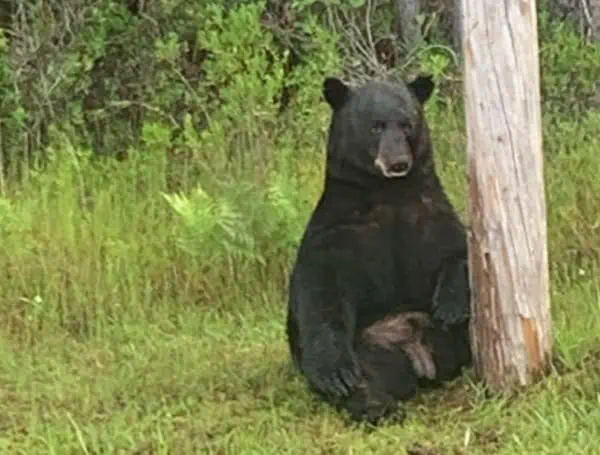Floridians are being reminded to exercise caution and adopt “BearWise” practices as black bear activity increases significantly across the state, particularly with juvenile bears venturing into unexpected areas. Spring and early summer mark a period of heightened activity for Florida’s black bears, resulting in more frequent sightings in suburban and urban areas.
The Florida Fish and Wildlife Conservation Commission (FWC) emphasizes that while seeing a bear in a neighborhood may be surprising, it’s not always cause for alarm.
“Juvenile or yearling bears – between the ages of 1½ -2½ – disperse from their mothers’ home ranges in spring and summer,” explains Mike Orlando, the FWC’s Bear Management Program Coordinator. “Yearlings can sometimes temporarily find themselves in places people wouldn’t expect to see bears as they pass through in search of new areas of their own to settle down. As long as people keep their distance, these bears typically move along on their own.”
READ; FWC Memo Outlines Potential Black Bear Hunt In Florida Amid First Recorded Fatal Attack
Cities like Jacksonville, Orlando, and Tampa, along with other populated areas, are experiencing an uptick in bear sightings. The FWC stresses that the most crucial response to any bear sighting, regardless of location, is to give the animal ample space and never approach or feed it.
Feeding bears, intentionally or unintentionally, can lead to them losing their natural fear of humans and can result in dangerous encounters. It is illegal in Florida to intentionally feed bears or to leave out food or garbage that could attract them.
While black bears are generally not aggressive, they can become defensive if they feel threatened. The FWC highlights that dogs have been involved in over half of the incidents where people have been injured by bears in Florida. Dog owners are advised to keep their pets on a non-retractable leash and be aware of their surroundings. Before letting dogs out at night, turning lights on and off and banging on the door can give bears and other wildlife a chance to leave the area.
READ: Florida Nears Vote On Bear Hunt Revival Following Rule Approval For Advertisement
With increased bear activity comes a higher risk of vehicle collisions. Drivers are urged to slow down, especially on rural highways at dawn or dusk, and to watch for road signs indicating bear crossing areas. On average, 300 bears are killed annually in Florida due to vehicle strikes.
To minimize conflicts and ensure both human and bear safety, the FWC recommends following these “BearWise Basics”:
- Secure Food and Garbage: Store garbage in sturdy sheds or garages, placing it out on the morning of pickup. Use bear-resistant containers if secure storage isn’t available. Protect gardens, beehives, compost, and livestock with electric fencing. Pick ripe fruit from trees and bushes and remove fallen fruit from the ground.
- Remove or Secure Bird and Wildlife Feeders: Ideally, remove all wildlife feeders. If feeders are left up, only put out enough food for wildlife to finish before dark and ensure feeders are bear-resistant.
- Never Leave Pet Food Outdoors: Feed pets indoors. If feeding outdoors, only put food out for short periods and bring in leftovers and dishes immediately after.
- Clean and Store Grills: Thoroughly clean and degrease grills and smokers after each use. Store mobile grills in a secure shed or garage.
- Alert Neighbors to Bear Activity: If you spot a bear, inform your neighbors and share tips on conflict avoidance. Encourage homeowner’s associations or local governments to implement bylaws or ordinances requiring secure trash storage.
For those experiencing ongoing conflicts with bears, FWC staff are available to assist. Contact the FWC regional office closest to you, which can be found at MyFWC.com/Contact under “Contact Regional Offices.”
In emergencies, or if you spot an injured, orphaned, or dead bear, feel threatened by a bear, or wish to report someone harming bears or intentionally feeding them, call the FWC’s Wildlife Alert Hotline at 888-404-FWCC (3922).
Please make a small donation to the Tampa Free Press to help sustain independent journalism. Your contribution enables us to continue delivering high-quality, local, and national news coverage.
Connect with us: Follow the Tampa Free Press on Facebook and Twitter for breaking news and updates.
Sign up: Subscribe to our free newsletter for a curated selection of top stories delivered straight to your inbox.
